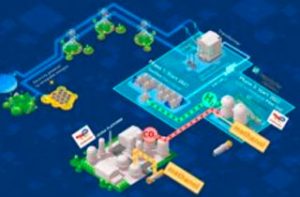- 20. 06. 2021
TotalEnergies, Sunfire and Fraunhofer give the go-ahead for green methanol in Leuna
TotalEnergies has launched the e-CO2Met project at the Hydrogen Lab Leuna together with the electrolyser manufacturer Sunfire, the Fraunhofer Center for Chemical-Biotechnological Processes CBP and the Fraunhofer Institute for Microstructure of Materials and Systems IMWS. There, methanol can be produced from low-carbon hydrogen and separated carbon dioxide. This is an important approach to reducing climate-damaging greenhouse gas emissions. With the aim of producing climate-neutral methanol on site, this demonstration project integrates the various building blocks necessary for this, such as the use of renewable energies.
TotalEnergies currently produces around 700,000 tonnes of fossil-based methanol per year at the TotalEnergies Mitteldeutschland refinery in Leuna, making it the largest methanol producer in Europe. The e-CO2Met project is therefore an important step towards climate neutrality. It aims to test the interplay of three innovative processes – the use ofCO2 from the refinery, the use of green hydrogen produced by high-temperature electrolysis, and the subsequent synthesis of methanol on the Hy2Chem scaling platform.
“TotalEnergies’CO2 capture and storage R&D program is developing approaches for the economically viable reuse ofCO2 that are in line with the company’s climate ambitions. e-CO2Met is TotalEnergies’ first pilot project to convertCO2 into methanol using renewable electrical energy. While this methanol itself can already be considered an e-fuel, it can mainly be used as a feedstock for further refinement into products such as sustainable jet fuels,” explains Marie-Noelle Semeria, Chief Technology Officer at TotalEnergies.
“With the innovative production of synthetic methanol, crude oil and natural gas can be replaced in the chemical industry and the required raw materials can be produced in a climate-neutral manner. In this way, we are making a contribution to the decarbonisation of basic chemicals,” says Thomas Behrends, Managing Director of TotalEnergies Raffinerie Mitteldeutschland.
Highly efficient electrolysis for hydrogen production from renewable energies
A core component of e-CO2Met is the 1 MW high-temperature electrolyser from the Dresden electrolyser manufacturer Sunfire. The efficiency of the plant for the production of green hydrogen from renewable electricity and steam is far higher than that of conventional electrolysers, at over 80 percent. As a result, the plant requires significantly less electricity to produce one kilogram of hydrogen.
“Our innovative electrolysis technology is the key to decarbonizing all industrial sectors that are still dependent on fossil fuels today. Especially in the refinery and chemical industry, clean and sustainable solutions are needed to achieve the EU’s ambitious climate targets. We are looking forward to a strong partnership in the e-CO2Met project”, says Sunfire Managing Director Nils Aldag.
Green methanol from renewable hydrogen and exhaust gas CO2
In the next step, the green hydrogen produced by electrolysis and highly concentratedCO2 from the refinery’s production processes are converted into green methanol. To this end, Fraunhofer CBP and TotalEnergies are planning a pilot plant that will be set up in the new Fraunhofer Hydrogen Lab at the Leuna Chemical Park. The pilot plant is the first project of the Hy2Chem scaling platform funded by the state of Saxony-Anhalt via ERDF funds. “With the Hy2Chem platform, we can test the use of regeneratively generated hydrogen for the production of basic chemicals and fuels in sustainable synthesis processes on a large scale for the first time – even under the conditions of a fluctuating hydrogen flow,” explains group leader Dr. Ulrike Junghans, who coordinates the project at CBP.
A basic prerequisite for the industrial implementation of such processes is the further development of electrolysers and synthesis processes. For this purpose, the Fraunhofer IMWS offers with the Hydrogen Lab Leuna a unique test infrastructure on an industrial scale as well as extensive scientific support. The Hydrogen Lab simulates different load profiles of the feed-in of renewable energies, maps the fluctuation during the course of the day and at different times of the year and thus provides important findings for the design and cost estimation of the systems.
“With the Hydrogen Lab Leuna, we are operating the first system test stands in Germany that are fully integrated into an infrastructure network of the chemical industry and thus enable projects in the field of power-to-X processes. We can test industrial electrolysers in real operation in an open technology environment, further develop them together with the industry, and at the same time gain valuable experience in feeding hydrogen into the pipeline system of our cooperation partner Linde – up to an initial five megawatts,” says Dr. Moritz Kühnel, who coordinates the research activities on electrolysis at the Fraunhofer IMWS.
The development of a hydrogen economy is an important building block on the way to achieving climate neutrality in Germany and Europe. Especially in connection with the use of hydrogen as a chemical raw material, there is also considerable potential for shaping structural change. Particularly at the industrial and chemical site of Leuna, a hub for green hydrogen and its derivatives can be created on the basis of many years of experience, existing infrastructure and the interaction between innovative companies and research institutes.
CONTACT
Sunfire GmbH
Gasanstaltstraße 2
01237 Dresden
Germany
Phone: +49 351 896797-0
Fax: +49 351 896797-831
Internet: www.sunfire.de
Email: info@sunfire.de
Share on the network:


